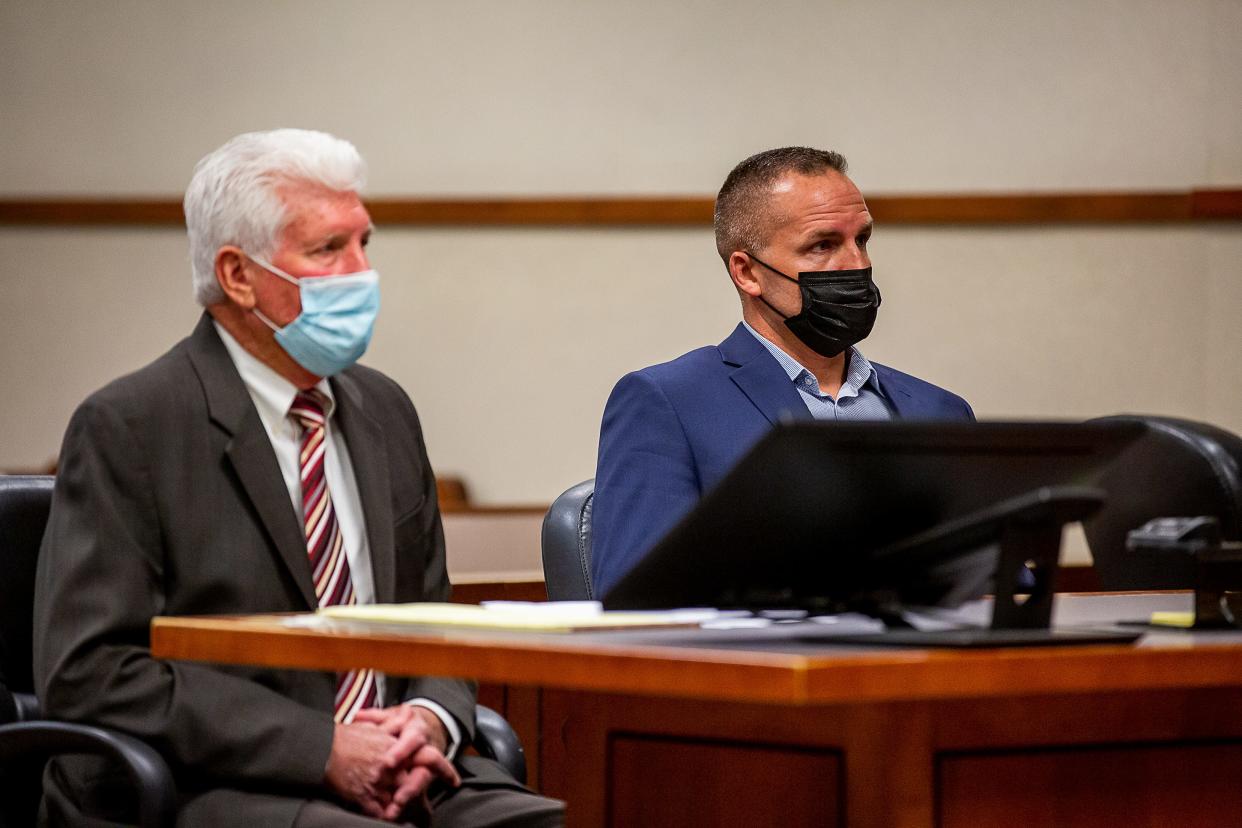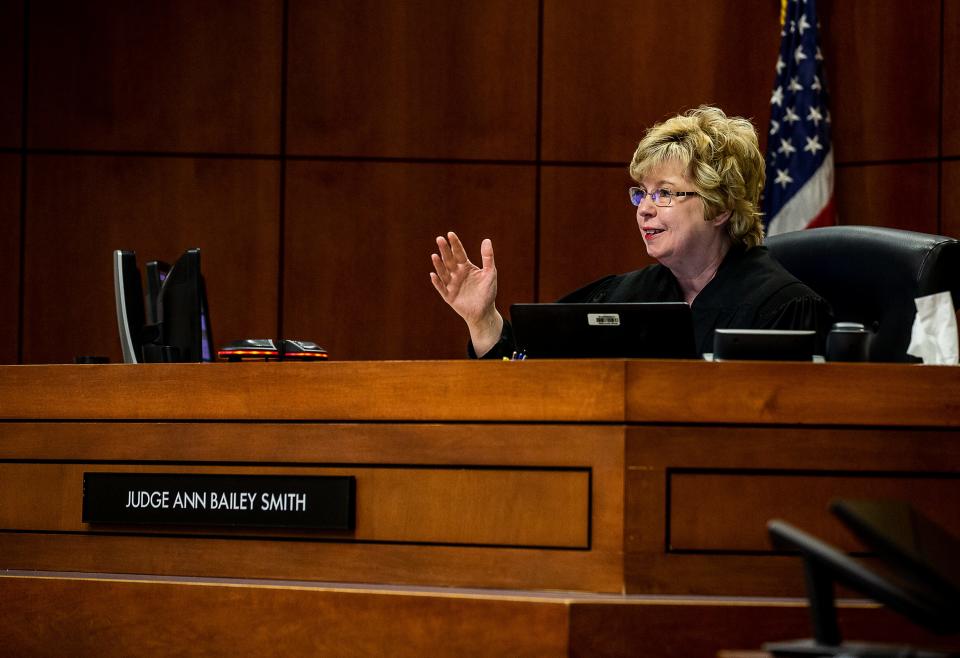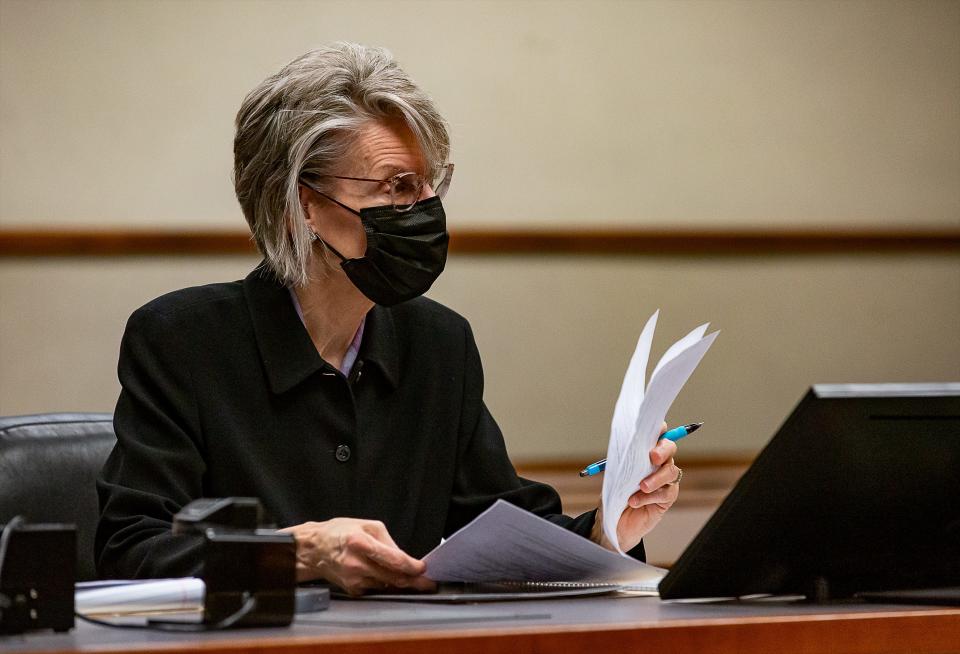Breonna Taylor case: Judge rules news media can watch jury selection for Hankison trial

LOUISVILLE, Ky. — Former Louisville Metro Police detective Brett Hankison's effort to keep the public and news media from watching juror questioning in his criminal case has been denied.
Circuit Judge Ann Bailey Smith has ordered that individual jury questioning will remain open, but no one watching proceedings can take photos or videos inside the courtroom.
Smith said the "extensive media coverage this case has generated" has necessitated this "narrowly tailored limitation."
"Jurors will individually take the witness stand and submit to questioning by counsel, a process that is inherently intimidating to a lay person," she wrote in the Thursday order. "The court finds that jurors will be likely to be less intimidated by this process, and therefore more likely to be candid in their responses, if they know there is no possibility that the general public and the media present at the proceeding have the ability to broadcast or otherwise record their testimony."
Hankison faces three counts of first-degree wanton endangerment, a class D felony, for the shooting at unfolded at Breonna Taylor's apartment just before 1 a.m. on March 13, 2020.

However, the charges aren't for endangering Taylor but rather three of her neighbors in an adjacent unit pierced by some of his 10 rounds.
The ex-detective has pleaded not guilty.
Jury selection will begin Friday, when around 250 potential jurors will be summoned and given a questionnaire. Some of those jurors will then be instructed to return Feb. 1, for individual questioning, with general jury selection set to begin Feb. 22 and a trial to follow.
Stew Mathews, Hankison's defense attorney, filed a motion last Friday seeking to ban the news media and public from seeing the individual questioning of jurors, known as individual voir dire.
The Attorney General's Office, which is acting as the special prosecutor in this case, opposed the effort, as did The Courier Journal, the Associated Press and WDRB Media.
Smith's order followed a hearing on the matter Wednesday morning.
Mathews said his goal was "not to start a war with the media."
"Rather, my goal is to do everything in my power to ensure that to ensure that Brett Hankison can be tried by a jury that's fair, that's impartial and that's unbiased," he said. "And I think this motion, perhaps, will give you a tool to see, or to ensure, that that happens."

Mathews reminded Smith he had filed a motion for a change of venue last year for similar reasons: "the massive, prejudicial, inflammatory publicity of the incident itself and then the events that occurred thereafter" in Louisville.
"I would wager there are very few citizens of Jefferson County — that is, prospective jurors — who have not heard about the case, have not discussed it and not formed an opinion or expressed an opinion or stated an opinion somewhere along the line," he said. "All that concerns me greatly and deeply with respect to our potential to pick an impartial jury."
Barbara Maines Whaley, a prosecutor from the Attorney General's Office, argued Smith has options that stop short of completely closing individual voir dire, such as prohibiting live-streaming, providing audio-only access outside the courtroom or providing news outlets with a DVD of the entire proceeding after the fact.
Michael Abate, the First Amendment attorney representing The Courier Journal, AP and WDRB, said the U.S. Supreme Court is clear that the "baseline rule is that questioning of individual jurors must be done in public with the court controlling the process."
Mathews said he is also concerned potential jurors would not be as open in their answers as attorneys would like with journalists present, and that they may fear their identities will be leaked.
Smith said she shared Mathews' concerns about a "chilling effect on the candor of jurors," especially as they are questioned individually with reporters watching.
"It will be my job to try to ease any concerns that they have and make them feel as comfortable as possible in this already uncomfortable setting so that they will give us the responses to the questions that we're asking of them," she said.
Taylor, a 26-year-old Black woman and emergency room technician, was fatally shot by LMPD officers as they attempted to execute a search warrant looking for drugs and cash at her apartment around 12:40 a.m.
Taylor's boyfriend, Kenneth Walker, fired one shot from his legally owned handgun when after officers used a battering ram to force open the apartment's front door. Walker's shot struck Sgt. Jonathan Mattingly in the thigh, severing his femoral artery.
In turn, Mattingly fired six rounds, detective Myles Cosgrove fired 16 and Hankison fired 10. Taylor was struck six times by Cosgrove and Mattingly, with the FBI concluding Cosgrove fired the fatal shot.
Walker has maintained he did not know it was officers on the other side of the door, but officers insist they announced their presence. Walker was initially charged for the shooting, but the criminal case against him has since been permanently dismissed.
Hankison was fired for his role in the shooting June 2020. Then-interim Chief Robert Schroeder accused Hankison of "blindly" firing 10 rounds into Taylor's apartment, calling his actions "a shock to the conscience."
Attorney General Daniel Cameron said Hankison's bullets did not strike Taylor. The other two officers, who did shoot Taylor, are not facing state criminal charges, as Cameron's team concluded they were defending themselves.
Cosgrove, too, was fired from LMPD in 2020 for the shooting. Mattingly retired last year.
Reach Tessa Duvall at tduvall@courier-journal.com and 502-582-4059. Twitter: @TessaDuvall.
This article originally appeared on Louisville Courier Journal: Breonna Taylor: Judge rules media can watch Hankison jury selection

